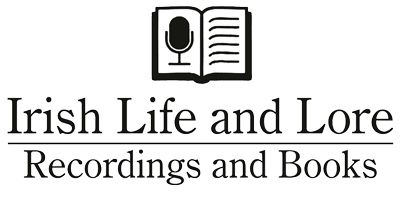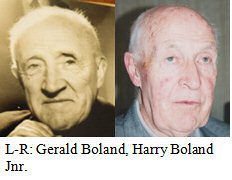Tom Meaney recalls his grandmother who was born in 1855, and explains that she had retained vivid memories of men returning from the raid on Mallow Barracks in 1867. Her cousin, Diarmuid Kelleher, had been sentenced to death in 1822 for his activities with the Whiteboys, and Tom describes the place in Carriganima where he and the thirty others were executed. Tom’s father, Con Meaney, would have heard about these events from history while growing up. Tom also discusses Seán Roibeárd Ó Súilleabháin (known as The Bard) who was sentenced with a man named Con Meaney, and research has established that Meaney escaped to America. Tom’s maternal family, the McSweeneys of Gortnafunshion in Ballymakeera, Co. Cork and their connection with the Old IRA in the revolutionary period is recalled. The Meaney family from near Millstreet is also recalled. Con Meaney was very much involved in the Gaelic League and he attended any GAA events within cycling distance. Tom explains that his father was one of the few members of the IRB in the Millstreet area, which he joined in 1912. Two Fenian men who were still active at the time are recalled, as are Jerry Twomey and Séamus Ó hIcí, two members of the IRB from the area. The link between Millstreet and P. H. Pearse is discussed. Pearse visited the town in August 1915, three weeks after he gave the oration at the grave of O’Donovan Rossa. Tom explains that it is planned to unveil a plaque at the Railway Hotel building, now Corkery’s Bar, to commemorate this occasion. Pearse then travelled from Millstreet with Volunteer members to Carriganima and on to Cork city where he addressed a gathering. On November 1st 1915, Terence MacSwiney had addressed a public meeting in Millstreet with a view to forming the Irish Volunteers. Three companies were then formed at Millstreet, Rathduane and Mushera, with a fourth company being formed some days later. Con T Meaney was Captain of the Mushera Company. Tom mentions that his father was never asked to attend an IRB meeting, as stated in his memoirs, but they did meet to commemorate the Manchester Martyrs. From January 1916 onwards, the men were drilling and exercising in preparation for the Rising. Tom explains that no word came through to Millstreet about the Easter Rising until it became known that it had taken place in Dublin. Keale Company was eager to dig up the railway line but their request was declined by those in command locally. Con’s first cousin, Cornelius J ‘Sonny’ Meaney, was given charge of the four local companies until the time of the Civil War. Tom recalls his father’s disappointment at the confusion surrounding communication of the Rising. He talks about the strict discipline of the time and explains that his father was Captain of Mushera Company and organiser, while Sonny Meaney became Commanding Officer of the Millltreet Battalion. Con T Meaney evaded arrest after the Rising and he went on the run with three others. This was a sacrifice as it resulted in a loss of income for the household, Tom explains. His father returned home when the prisoners were released towards the end of the year. By the time of the War of Independence there were approximately 800 men in the battalion area. Con was involved in events at Rathcoole, the railway ambush at Drishane Beg and the Clonbanin Ambush. Tom recalls Fr Joe Breen who was transferred from Tralee to Millstreet and became chaplain to Drishane Convent in 1916 and also to the Irish Volunteers. The proposed plan for the assassination of Fr Breen in Millstreet is mentioned. He went on the run when the information was leaked via an RIC man. Tom remarks that no member of the RIC from the Millstreet Barracks was ambushed or shot. He explains how messages were delivered inside the cover of a copy of the Cork Examiner. Con Meaney’s character is reflected upon, and Tom remembers his father as being religious and as a man of peace. The victory dance held after the train ambush is recalled and Tom remarks that Fr Breen was the guest of honour, though still on the run. During the Civil War, Con Meaney supported the anti-Treaty side and his son explains his reasoning. He did not see the Treaty as a stepping stone towards a thirty-two county Ireland. He also regarded the Boundary Commission as a disaster. He was commandant of the area during the Civil War and was interned at Tintown in the Curragh, and Tom describes an incident from this time. Later, Con Meaney was selected as Fianna Fáil candidate for the 1928 election as a county councillor, and he served until his death in 1970. He was elected T.D. for North Cork in 1937, 1938 and 1961, and his son describes his engagement with the rural community. The difficulties he had to overcome during the 1930s are mentioned. Tom discusses his home, Rathroe House, which was once the ancestral home of the McCarthys. The Meaney family moved into the house in 1939. The 1918 election and its importance to Con Meaney is recalled. He opposed Home Rule and felt that the people’s voice should have been listened to in 1918. Con was always a great supporter of De Valera, his son explains, and he was not a man to hold a grudge. Tom recalls his father’s election to the Dáil in the late 1930s, and he reads Seán Moylan’s note of thanks to the Returning Officer and his staff.

Tom Meaney (b. 1931)
 Jack Sweeney (b.1932) and Sr Aloysius Sweeney (b. 1917)
€10.00 – €20.00
Jack Sweeney (b.1932) and Sr Aloysius Sweeney (b. 1917)
€10.00 – €20.00 Ciarán Murphy (b. 1957)
€10.00 – €20.00
Ciarán Murphy (b. 1957)
€10.00 – €20.00Tom Meaney (b. 1931)
€10.00 – €20.00
Additional information
| Type: | MP3 |
|---|---|
| Audio series: | The 1916 Rising Oral History Collections |
| Bitrate: | 128 kbps |
| Download time limit: | 48 hours |
| File size(s): | 41.76 MB |
| Number of files: | 2 |
| Product ID: | CD191602-124 |
| Subject: | Con Meaney (Interviewee’s father) |
| Recorded by: | Maurice O’Keeffe – Irish Life and Lore |






